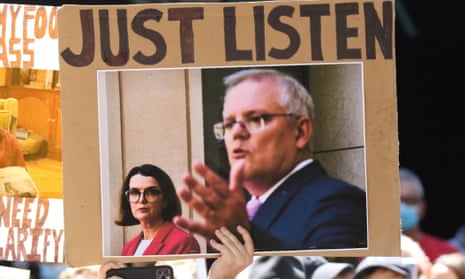Public trust is critically important for pandemic recovery. Without it, the confidence necessary to build an effective and sustained recovery is in peril. People need to trust the government to support more government intervention that makes a difference.
In mid-2020, Australia was widely viewed by the public as having successfully managed the pandemic, especially compared to the US, UK and other European countries. Australians’ trust in their government almost doubled in a year from 29% to 54%.
The same is not the case today.
Our latest research with the Social Research Institute at Ipsos shows that trust in people in government has declined 12 points from 54% to 42% in a matter of months.
It’s common for people to show support for their leaders during crises. In early 2020 during the initial stages of the pandemic, surveys showed leaders in a large number of countries enjoying an increase in public confidence.
The groundswell of support is partly explained by what is called the “rally-round-the-flag” effect. In Australia, prime minister Scott Morrison’s approval rating soared due to his effective handling of the initial threat, judicious decision-making on early closure of international borders and an atypical coordination of state and federal governments via the national cabinet.
Moreover, a severe threat like a pandemic can make people more information-hungry, anxious and fearful. Covid-19 has become a powerful shared experience for people. It touched most households through people’s connections with health and social care workers and their communication with relatives, co-workers or friends who were in lockdown or unfortunate enough to get sick.
Yet, research also suggests that people do not lose their capacity for reason or critical judgment in a crisis. For example, people can oppose wars or other heavy-handed responses to terrorist attacks even if such attacks make them more anxious or fearful.
Above all, the competence and outcomes of the government’s actions matter.
If the government is perceived as not able or willing to adequately respond to a threat, then public support will fade. It was therefore expected that public trust would increase once the government had got to grips with the vaccine rollout.
Yet despite the outstanding performance of the National Covid Vaccine Taskforce and the successful implementation of Operation Covid Shield by Lt Gen John Frewen and his team, public trust has continued to wane.
Is there something distinctive about the present trust debacle or are we returning to a longer term pattern of distrust in our political class?
The fieldwork for our latest survey was conducted in October in the middle of an upsurge in social protest at the inevitable erosion of civil liberties brought about by the withdrawal of certain individual rights during lockdown, increased state surveillance through the use of smartphone location tracking, and social media monitoring.
There was also a whirlwind of evidence from both sides of politics of various forms of rorting and misconduct at the commonwealth and state levels.
As Michelle Grattan puts it, “It’s sometimes said that today there are more scandals, more rorts, more breaches of proper standards of conduct than in the past. It’s possibly so. But it may also be that with such a blanket of media these days, we hear more about the scandals.”
Public cynicism is fuelled by habitual examples of poor parliamentary conduct.
At the same time, people are proving highly vulnerable to fake news and conspiracy theorists, who are taking advantage of mixed messaging by government to try to sow more confusion.
Our survey findings suggest that institutions viewed as extending the protective power of democracy in a time of fear – safeguarding our civic culture and heritage, community security, health and wellbeing – were most trusted.
For example, note the high levels of trust in defence and law and order organisations such as the police (76%), army (73%) and the courts (61%). Moreover, the highest levels of trust are bestowed to Medicare (80%); cultural institutions such as libraries (82%) and museums (78%); and universities (70%) and experts (79%). Trust in the Australian public service also remains quite high at 55%.
In contrast, institutions deemed, rightly or wrongly, to be acting on the basis of self-interest or against the collective interest faired worst. And unfortunately, politicians figure strongly. There is evidence of receding trust in political parties (20%), the national cabinet (38%) and other key institutions held responsible for bringing politics into disrepute such as television (35%), the press (30%) and especially social media (15%).
So what needs to be done to reverse the decline in public trust? Last year, we asked Australians what they would like their democracy to look like post-Covid-19? Their responses provide strong clues on the trajectory of reform.
In general, there is still overwhelming support for representative democracy but with a focus on making the representative system of government more representative of the people they serve, and accountable and responsive to their constituents underpinned by integrity politics which are “cleaner”, “collaborative” and “evidence-based”.
What is certain is that the next election will be won or lost on which party is best able to forge a national consensus on a post-Covid-19 recovery plan.
This is not a mere matter of economics but about the type of society we want to live in, the values that should drive it and the form of democracy which will best protect us in a turbulent and uncertain world.
